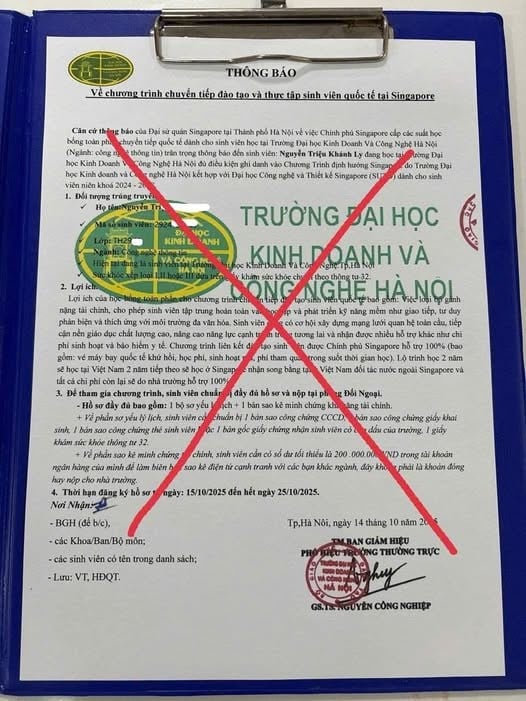
Scammers posing as schools
Recently, the Student Affairs Department of Hanoi University of Business and Technology (HUBT) received reports that students were scammed out of up to 300 million VND through fake announcements of admission to international study abroad and internship programs in Singapore. The subjects forged the school's seal, signature, and logo, sending "notices" and "decisions" that looked very similar to real documents to create trust. They then asked students to pay "application fees", "confirmation fees", "financial guarantee fees"... into their personal accounts.
This is a familiar scenario but it is becoming more and more sophisticated. The worrying point is that these scams are not new but have been spreading to many universities across the country.
On November 2, the Criminal Police Department, Ho Chi Minh City Police also announced a new type of "online kidnapping" trick, after consecutively recording two cases of fraud that appropriated billions of dong by faking international study abroad scholarships. On October 28, Mr. HNL reported that his daughter, a student, was missing after saying she was completing procedures to receive a "study abroad scholarship in Canada". At the request of the "scholarship unit", Mr. L transferred 1 billion dong to "prove financial status". When the subjects continued to ask for another 1 billion dong to "redeem the person", the family became suspicious and reported. Thanks to the timely action of the authorities, the victim was safely rescued. Similarly, on October 29, the police force also received a report that student T was missing and the family received threatening messages with sensitive images, demanding that they transfer 200 million dong "to prevent it from being spread". Through verification, the authorities discovered that T. was staying at a hotel in Cho Lon area. Working with the police, T. stated that from October 25 to 28, he was lured into participating in a "Chinese study abroad scholarship", and had to pay application fees and deposits. Trusting him, his family transferred a total of 3.45 billion VND.
Before that, in Hanoi, the family received text messages and phone calls from K urging him to transfer money to study abroad in the US with a commitment to support 100% of the study abroad costs, only requiring proof of financial resources of 680 million VND. When his parents did not agree, K became angry and texted that he would not return home. Realizing there were unusual signs, the family went to the police to report. After many hours of persistent persuasion, K realized that he was being scammed by a group of people impersonating the police and returned home safely.
But through these incidents, it can be seen that it will be a silent tragedy. The loss is not only money. The biggest loss is when a young person, on the journey of building knowledge and effort, is suddenly pushed into a state of losing faith in international scholarships and foreign internships. More serious is the psychological scar, the feeling of shame and self-blame that makes them silent. Therefore, students today not only need to equip themselves with knowledge but also need to equip themselves with prevention.
Be alert from small signs
According to the authorities, there are some signs that help young people and students identify fraudulent behavior early: Documents requesting money transfers to personal accounts, not the official accounts of the school or official partners; Information via strange emails, Zalo, Telegram not belonging to the school system; Urgent deadline for money transfer requests, to create pressure; No official announcement on the school's website or fanpage, but when asked again through official channels, the subject requests not to inform anyone, threatens to "lose their place"...
Legally, the act of using false information to appropriate money shows signs of the crime of "fraudulent appropriation of property" under Article 174 of the Penal Code; the act of forging seals and documents may be related to Article 341.
In addition, the school needs to establish a quick warning mechanism, a list of approved programs, and standard documents for students to compare. Parents and students should always check before transferring money, consult the school's website, homeroom teacher, student affairs office or embassy in the destination country...
Genuine scholarships are always transparent, have a public announcement process, and especially do not charge fees through personal accounts. Therefore, absolutely do not transfer money, do not provide personal information or bank accounts to any individual or organization without verification through the school's official information channels.
Source: https://nhandan.vn/nhung-giac-mo-bi-danh-cap-post920522.html



![[Photo] Panorama of the Patriotic Emulation Congress of Nhan Dan Newspaper for the period 2025-2030](https://vphoto.vietnam.vn/thumb/1200x675/vietnam/resource/IMAGE/2025/11/04/1762252775462_ndo_br_dhthiduayeuncbaond-6125-jpg.webp)

![[Photo] Ca Mau "struggling" to cope with the highest tide of the year, forecast to exceed alert level 3](https://vphoto.vietnam.vn/thumb/1200x675/vietnam/resource/IMAGE/2025/11/04/1762235371445_ndo_br_trieu-cuong-2-6486-jpg.webp)
![[Photo] The road connecting Dong Nai with Ho Chi Minh City is still unfinished after 5 years of construction.](https://vphoto.vietnam.vn/thumb/1200x675/vietnam/resource/IMAGE/2025/11/04/1762241675985_ndo_br_dji-20251104104418-0635-d-resize-1295-jpg.webp)







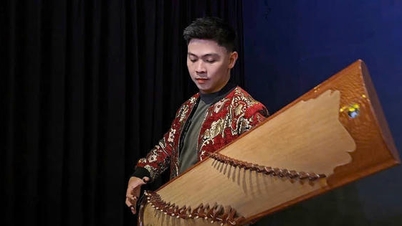








![[Video] 5 specific requests for comments on the draft documents of the 14th Congress](https://vphoto.vietnam.vn/thumb/402x226/vietnam/resource/IMAGE/2025/11/05/1762302892217_dung01-03-26-03still014-jpg.webp)






























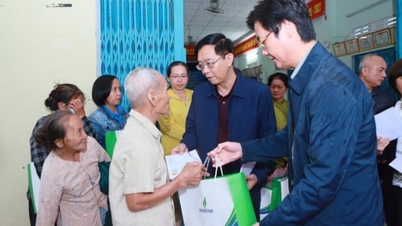




















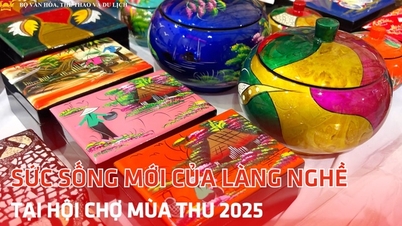



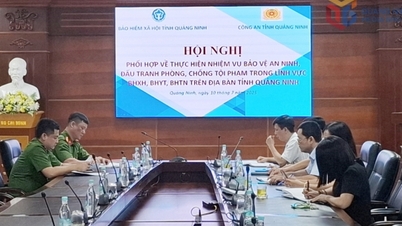




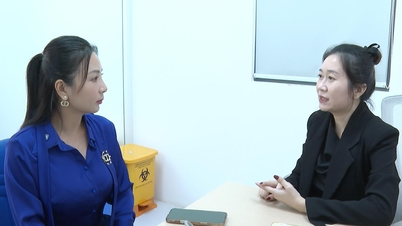


















Comment (0)